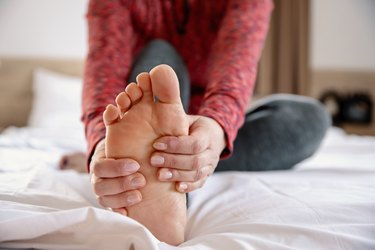
Most of us will experience sore or achy feet from time to time, especially after being on them all day. But if your feet burn when you walk, something else might be going on.
There's a good chance you might just need to change your shoes or take your activity down a notch to give your feet some rest. But in some cases, burning feet from walking could be a sign of an underlying health problem, so it's worth getting it checked out.
Video of the Day
Video of the Day
Here's how to tell what might be hurting your feet and what you can do to get some relief.
1. Your Shoes Are Too Narrow
Specifically, the toe box. Footwear that's pointy, tapered or narrower than your foot's actual shape "is the most common shoe problem that can cause a feeling of burning while walking," explains Alissa Kuizinas, DPM, a podiatrist in Concord, Massachussetts.
Narrow shoes compress the front of your foot, placing pressure on the surrounding nerves that can cause a burning, tingling or stabbing feeling. Sometimes the pain can radiate toward your toes too, Dr. Kuizinas says, which is why you might have a burning pain in your toes when walking.
Fix It
Swap your narrow shoes for a pair with a wide and round toe box instead of pointy or tapered, Dr. Kuizinas recommends. Sneakers tend to be the best bet, like these roomy picks.
You can also shop for footwear that accommodates any foot conditions you might have. For example, check out our lists of the best shoes for hammertoes, bunions, heel spurs, flat feet and plantar fasciitis.
2. Your Shoes Are Too Stiff
You might also feel the burn from wearing shoes with a very stiff sole or ones that only bend in the middle (where the arch of your foot is). Both types "will disrupt the normal mechanics of the feet during walking, causing the foot muscles to either be constantly stretched or constantly compressed," says Dr. Kuizinas.
In addition to your feet hurting and burning, you might also notice a sense of tightness or tension along the bottoms of your feet.
Fix It
The ideal shoe has a flexible sole that you can easily fold or bend, Dr. Kuizinas says. (Again, sneakers win out here!)
If you opt to wear dress shoes or other shoes with a stiffer feel, at least make sure the soles bend at the balls of your feet (not the arches) to allow for normal foot mechanics, she recommends.
3. Your Heels Are Too High
The higher the heels, the more likely your feet will start to feel like they're on fire.
Heels put tons of pressure on the balls of your feet and cause your foot and calf muscles to contract, which can both cause that painful burning sensation, Dr. Kuizinas explains.
Fix It
Trade your heels for flats (or the lowest heel possible if you insist on a lift). While you're at it, make sure the flats have a wide toe box and a flexible sole for maximum comfort, Dr. Kuizinas recommends.
4. You Have Nerve Damage
If you've confirmed that your foot pain isn't coming from your shoes, you may be experiencing peripheral neuropathy or nerve damage. According to the Mayo Clinic, it's the most common cause of burning feet.
When the small, peripheral nerves in the feet become damaged, they can start to send signals inappropriately, which can cause a burning or stabbing sensation, Dr. Kuizinas explains. Some people also notice numbness, tingling and weakness or loss of balance.
Undermanaged diabetes is often to blame for peripheral neuropathy. But it can also stem from a B vitamin deficiency, chronic kidney disease, alcohol abuse, chemotherapy or an underactive thyroid, the Mayo Clinic notes.
Fix It
See your doctor if you suspect you have peripheral neuropathy. Medications may be able to address the nerve damage and ease your symptoms, notes the National Institute of Neurological Disorders and Stroke.
You'll also need to get to the underlying cause of your neuropathy and determine the best way to address it so the damage doesn't get worse.
5. You Pushed Yourself Too Far During Exercise or Activity
Recently started a new activity or exercise routine and are plagued by sore, burning feet? Chances are you did a little too much without giving your feet time to adjust and get stronger.
When you push yourself too far (especially as you get older), "the tissues and the nerves on the feet don't yet have adequate tolerance to support that much activity," Dr. Kuizinas explains.
Fix It
Pain or burning from overexertion should ease up when you give your feet a rest, Dr. Kuizinas says. If you need more relief, give your overtired feet a break, keep them elevated and apply an ice pack.
When you're ready to start moving again, ease back into your activity at a more gradual pace.
6. You Have a Stress Fracture
Intense overuse or repetitive activities like running (or running-intensive sports like soccer or basketball) can sometimes cause a stress fracture in the foot.
These small cracks within a bone in the foot can cause intense pain and tenderness that tends to be worse when you're using the foot, Dr. Kuizinas points out. But when you're off your feet, the pain might disappear.
You might also notice bruising or swelling around the affected area.
Fix It
Fix it: Rest, ice, compression and elevation can help your stress fracture heal, says the American Academy of Orthopaedic Surgeons.
It's important to see your doctor too: A physical exam and X-ray can help you determine how severe the fracture is and how long you'll need to rest your foot in order for it to completely get better.
When to See a Doctor About Sore and Burning Feet
Touch base with your doctor if at-home measures like wearing different shoes or resting haven't helped your feet feel better within a week or two, recommends the National Library of Medicine.
You should also contact your doctor if:
- Your foot pain is sudden or severe
- You suspect your foot is injured or you can't put weight on it
- Your foot seems red or swollen, has an open sore or you have a fever
- You have foot pain and diabetes
Is this an emergency? If you are experiencing serious medical symptoms, please see the National Library of Medicine’s list of signs you need emergency medical attention or call 911.


